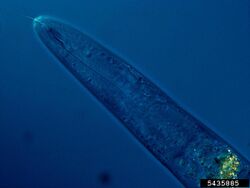Biology:Trichodorus
| Trichodorus | |
|---|---|

| |
| Scientific classification | |
| Kingdom: | |
| Phylum: | |
| Class: | |
| Subclass: | |
| Order: | |
| Suborder: | |
| Superfamily: | Diphtherophoroidea
|
| Family: | |
| Genus: | Trichodorus Cobb, 1913[1]
|
| Type species | |
| Trichodorus primitivus (de Man, 1876) Micol. 1922. | |
| Species | |
|
54
| |
| Synonyms | |
|
Dorylaimus primitivus | |
Trichodorus is a genus of terrestrial root feeding (stubby-root) nematodes in the Trichodoridae family (trichorids), being one of five genera.[2] They are economically important plant parasites and virus vectors.[3]
Taxonomy
As originally described by Cobb in 1913, Trichodorus was the only genus in its family. However, in 1974 the genus was split into two genera in 1974 by Siddiqi,[4] Trichodorus and Paratrichodorus.
The genus, which is the largest in the family consists of 54 species.[5] The females are didelphic (two genital tracts), and are distributed worldwide.
Plant pathology
Trichorids became of interest in 1951.[6] At that time Trichodorus christie (=Paratrichodorus minor) was recognised as a pest of crops in Florida.[7]
References
- ↑ Cobb, N. A. (1913). "New nematode genera found inhabiting fresh water and non-brackish soils". J. Wash. Acad. Sci. 3: 432–444.
- ↑ Order Triplochida: Paratrichodorus Nemaplex: Nematode-Plant Expert Information System. University of California, Davis. Version October 9, 2012.
- ↑ Decraemer 1995.
- ↑ SIDDIQI M.R. (1974). Systematics of the genus Trichodorus Cobb, 1913 (Nematoda: Dorylaimida), with descriptions of three new species. Nematologica, 19 : 259-278.
- ↑ Decraemer, W; Robbins, RT (2007). "The who, what and where of longidoridae and trichodoridae". J Nematol 39 (4): 295–7. PMID 19259501.
- ↑ CHRISTIE, J. R. & PERRY, V. G. (1951). Removing nematodes from soil. Proc. helm. Soc. Wasb. 18: 106-108.
- ↑ Decraemer 1995, p. 3.
Bibliography
- Blaxter, Mark L.; De Ley, Paul; Garey, James R.; Liu, Leo X.; Scheldeman, Patsy; Vierstraete, Andy; Vanfleteren, Jacques R.; Mackey, Laura Y. et al. (5 March 1998). "A molecular evolutionary framework for the phylum Nematoda". Nature 392 (6671): 71–75. doi:10.1038/32160. PMID 9510248.
- Lee, Donald L, ed (2010). The biology of nematodes. London: Taylor & Francis. ISBN 978-0415272117. https://books.google.com/books?id=omQLBAAAQBAJ. Retrieved 16 December 2014.
- De Ley, P & Blaxter, M 2004, 'A new system for Nematoda: combining morphological characters with molecular trees, and translating clades into ranks and taxa'. in R Cook & DJ Hunt (eds), Nematology Monographs and Perspectives. vol. 2, E.J. Brill, Leiden, pp. 633–653.
- Decraemer, W. 1980. Systematics of the Trichodoridae (Nematoda) with keys to their species. Revue. Nematol. 3(1): 81-99.
- Decraemer, W. (1995). The family Trichodoridae : stubby root and virus vector nematodes. Dordrecht: Kluwer Academic Publishers. ISBN 978-0792337737. https://books.google.com/books?id=qW19ryMat_EC. Retrieved 15 December 2014.
- Zuckerman, B.N.; Mai, W.F.; Rohde, R.A., eds (1971). Plant Parasitic Nematodes: Volume I. Morphology, Anatomy, Taxonomy, and Ecology. Oxford: Elsevier Science. ISBN 978-0323154246. https://books.google.com/books?id=UlNTQl4E4nIC. Retrieved 15 December 2014.
- Perry, Roland N.; Moens, Maurice, eds (2013). Plant nematology (2 ed.). Boston, MA: CABI. ISBN 978-1780641515. https://books.google.com/books?id=LTv7AgAAQBAJ. Retrieved 16 December 2014.
Wikidata ☰ Q18520281 entry
 |

